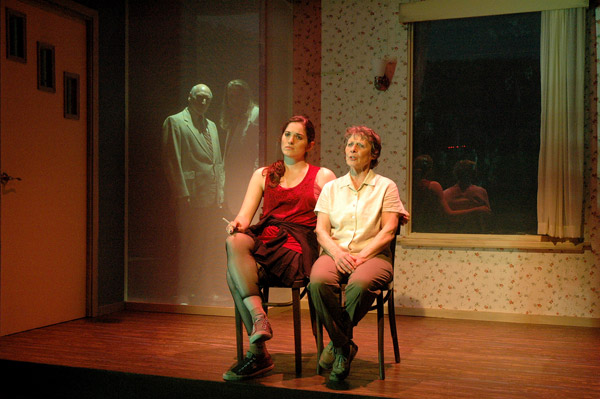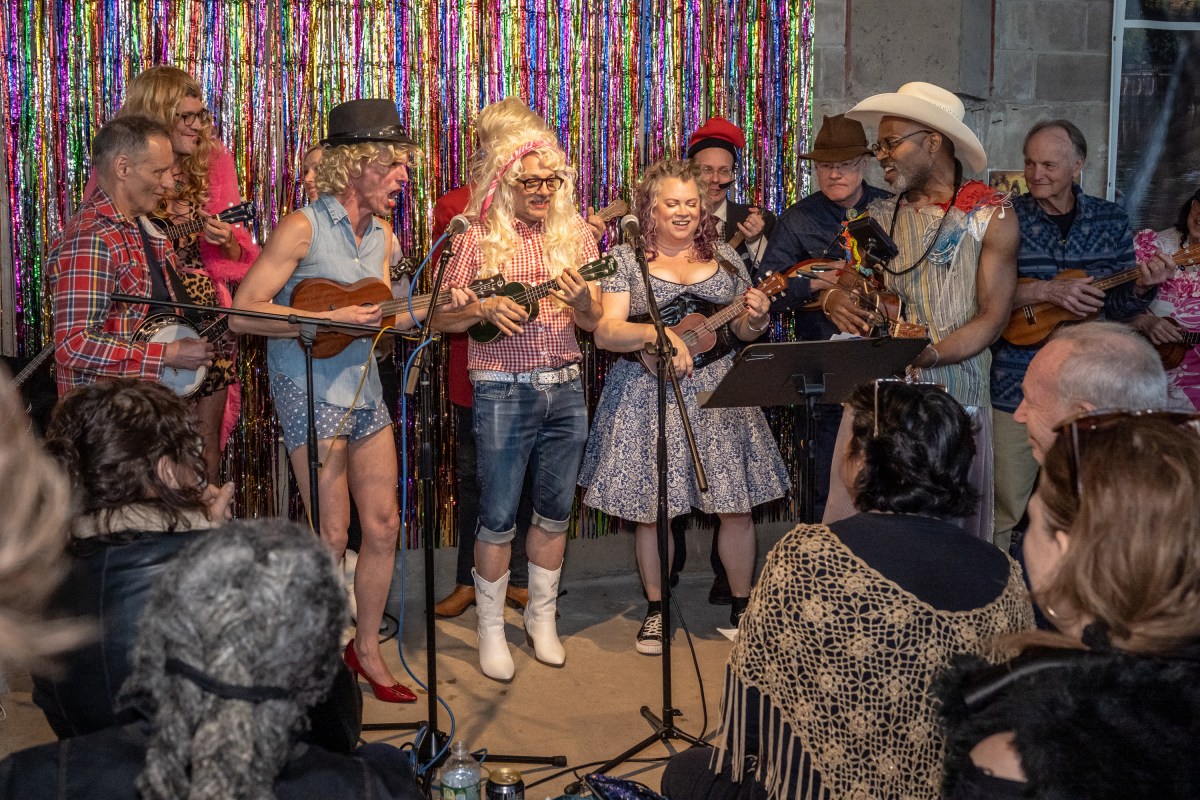
L to R: Joel Leffert, Harlan J. Alford, Linda Tardif and Tina Shepard, in “Marcellus Shale.”
Talking Band’s latest digs deep below the surface
BY MARTIN DENTON (of nytheatre.com and indietheaternow.com) | When I first saw the title “Marcellus Shale,” I thought it was somebody’s name: it sounds like the moniker of a character in a Thornton Wilder play, doesn’t it? It’s not, though. Paul Zimet got the title for his latest work from a geological formation located in the Appalachian Basin, including the Catskills in Southern New York.
This region is at the center of some significant controversy at the moment, for it contains massive amounts of untapped natural gas resources that many entities want to tap using the process known as fracking.
But my leap toward Thornton Wilder proved apt, as it turned out. This new work by Zimet — a remarkable, wise, deeply moving, highly necessary play — is in its way a descendent of “Our Town,” examining the details and rhythms of usually unexamined American lives to reveal something at once ineffable and fundamental.
Zimet’s not interested here in what’s eternal, but rather in what’s inexorable. “Marcellus Shale” is not so much about policy or economy as it is about complacency and inertia. Its central question is: How did we get to this place, where a society of supposed rugged individualist can-do Yankees got cowed into submission by a passel of entities that are too big — not just to fail, but also to topple or even to challenge?
“Marcellus Shale” unfolds in a small New York town only a few years into the future (the play is set in 2016), where gas companies have disrupted virtually every aspect of a life that residents sold out for leases that felt lucrative but now perhaps seem paltry.
The story revolves around four families: Tom and Bonnie, who leased their farm and are now retired; Betty, who works as a First Responder and whose son, Duncan, has just returned from the military abroad; Alex, a middle-aged stoner whose son Pablo has also just returned home; and Adelyn, a corporate trainer whose daughter Rona has also just returned home (from NYC).
The play has a strong narrative throughline, but I leave its compelling details for you to discover. It also probes into the rituals and dreams of these varied people, and finds in them evidence (as opposed to reason) that help us see, from our vantage point as onlookers, the paths these folks have taken.
Zimet gets under these characters’ skin with insight and eloquence. Here’s one of my favorite moments, in which Tom contemplates hitting the road:
I
sometimes had
had thought
had thought when I was younger that I’d like to
be a truck driver and see a lot of the country
and
well
Well yes I’d like to I’d like to see an awful lot of our country
I’ve I’ve always been
uh
had the wish to
see the Great Smoky Mountains and
see the uh the Grand Canyon of the Colorado
and uh
Rocky Mountains and
Mojave Desert and you know all the all the places that you see beautiful pictures of…
The play is gorgeously lyrical and suspenseful and involving. Zimet’s staging is signature Talking Band style — meaning that there’s not a wasted or unnecessary movement or transition; that there’s always music (by Ellen Maddow) and singing, and even dancing (sometimes, especially when you don’t expect it); that the ensemble work is tight and flawless and that simultaneously each of the production’s ten remarkably accomplished actors creates a full-bodied, empathetic, deeply human character.
The actors are Harlan J. Alford, Suli Holum, John Kurzynowski, Joel Leffert, Ellen Maddow, Mike Mikos, Steven Rattazzi, Tina Shepard, David Smilow and Linda Tardif. The design is stunning, with thrillingly evocative sets and video by Anna Kiraly, sound by Maddow, lights by Lenore Doxsee and Natalie Robin, and costumes by Kiki Smith, all working together to create a magical and theatrical world for a play that is mostly about the ground and our relationship to it.
I think what I most admire about “Marcellus Shale” is the fact that Paul Zimet has written it at all. In a time when so many artists seem content to gripe and grumble on blogs or Facebook, Zimet has done what he does best: creating a work of theater art to try to figure out how we got into this mess and what we are supposed to do about it. And I love, too, that of course no simple answer is promulgated here — we live in complicated, difficult times, after all; except, perhaps, the simplest answer of all, which comes in the play’s final, resonant moment.
“Marcellus Shale” does what great art is supposed to do. It engages us, jolts us, surprises and challenges us (even drawing the unexpected smile now and then, given its somber setting).
If we can get art as beautiful as this, then there’s hope that we can fix anything, right?
Note: This review first appeared on nytheatre.com.
THEATER
MARCELLUS SHALE
Written & Directed by Paul Zimet
Music by Ellen Maddow
A Talking Band production
Through June 9
At La MaMa
74A E. Fourth St. (btw. Bowery
& 2nd Ave.)
Tickets: $25 ($20 for
students/seniors)
For reservations, call 212-475-7710 or visit lamama.org

















